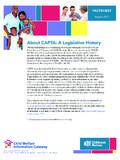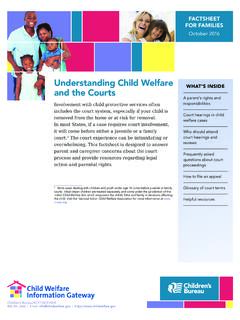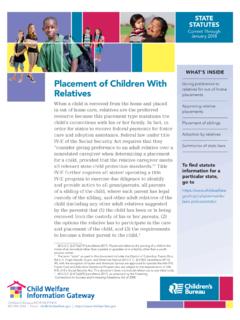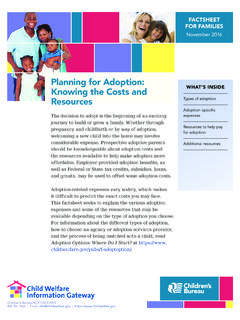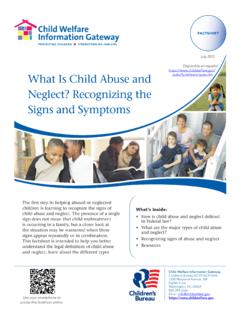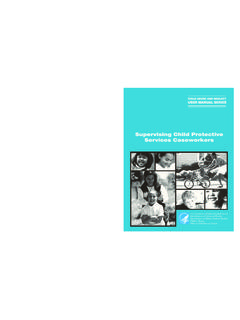Transcription of Extension of Foster Care Beyond Age 18 - Child Welfare
1 Children s Bureau/ACYF/ | Email: | STATUTESC urrent Through February 2017 WHAT S INSIDEA vailability of Foster care Beyond age 18 Requirements for remaining in placementPlacement agreementsTransition supports providedSummaries of State lawsTo find statute information for a particular State, go to of Foster Care Beyond Age 18 Young people leaving Foster care are often at different levels of development in their transition to adulthood . With the growing recognition that most young people are not fully prepared for self-sufficiency by age 18, States offer a variety of programs, including Foster care, to this Option to Extend Foster CareThe Federal Fostering Connections to Success and Increasing Adoptions Act of 2008 ( 110-351) amended the title IV-E program to give States the option of allowing youth to remain in Foster care after reaching age 18, provided that they have not yet reached age 19, 20, or 21, as the State may elect. The conditions for continued title IV-E payments apply to youth over age 18 and require the youth to be completing secondary school (or the equivalent), enrolled in postsecondary or vocational school, participating in a program or activity that promotes or removes barriers to employment, employed 80 hours a month, or incapable of school and/or work requirements due to a documented medical The act also amended the definition of a Child care institution in 42 672(c)(2) to include a supervised setting in which an individual who has reached age 18 is living See 42 675(8)(B)(iv) (2015).
2 TnhTohgTtreFhbaFehye2Tn0h17ehps2 This material may be freely reproduced and distributed. However, when doing so, please credit Child Welfare Information Gateway. This publication is available online at of December 1, 2016, 24 States have opted into providing some level of extended Foster care under the Fostering Connections Act through programs that have been approved by the Children s Bureau (see figure 1 on page 5). The Children s Bureau offers guidance on the provisions of this legislation in Program Instruction ACYF-CB-PI-08-05 ( ), issued October 23, 2008, and Program Instruction PI-10-10 ( ), issued June 7, also extend Foster care services and supports to youth in their Foster care system after age 18. State-funded extended Foster care programs are not required to meet the requirements of the Federal Extended Foster Care program, but many follow the school and work requirements of the Federal program. Availability of Foster Care Beyond Age 182In approximately 46 States, the District of Columbia, and American Samoa, youth who are in out-of-home care at the time they reach their 18th birthday are allowed to extend that placement and continue receiving services from the social services In most cases, youth may remain under agency supervision until age 21 in situations that can include Foster care, a supervised independent living arrangement, or the provision of transitional living services while they continue working on educational or vocational goals and further develop their independent living skills and transition to The information below includes States that are approved to operate an extended Foster care program through the Federal option and State-funded The word approximately is used to stress the fact that the States frequently amend their laws.
3 This information is current through February 2017. The following States allow an Extension of Foster care up to age 21, except as noted: Alabama, Alaska, Arizona, Arkansas, California, Colorado, Connecticut, Delaware, Florida, Georgia, Hawaii (to age 19 or age 20 for a youth still in high school who is receiving special education services), Idaho, Illinois, Indiana (to age 20), Iowa, Kansas, Kentucky, Maine, Maryland, Massachusetts (to age 22), Michigan, Minnesota, Mississippi, Missouri, Montana, Nebraska, Nevada, New Hampshire, New Jersey, New Mexico, New York, North Carolina, North Dakota, Oklahoma, Pennsylvania, Rhode Island, South Carolina, South Dakota, Tennessee, Texas, Vermont (to age 22), Virginia, Washington, West Virginia, Wisconsin, and Wyoming. Louisiana, Ohio, Oregon, and Utah do not offer continued Foster care and supervision but do provide support services to former Foster youth to age The sources of funding for these programs, whether Federal or State, are not identified in the statutes and regulations 31 States, youth who leave Foster care when they reach age 18 may request, at any time prior to their 21st birthday (or as otherwise specified in State law), to return to Foster care (which may be in the form of a supervised Independent Living situation or a resumption of transitional living services).
4 5 A return to Foster care is permitted when a youth has attempted to live independently but now a youth needs continued assistance and support. In these States, youth can return to care and/or supervision in order to pursue educational or job training goals, to ensure his or her personal safety, or to further develop the skills needed to achieve for Remaining in PlacementYouth who elect to remain in or return to Foster care are required to meet specific eligibility requirements that are articulated in Federal law (as applicable), State law, regulation, or policy. In most cases, youth also need to work actively with their caseworkers to develop and implement case plans that help them reach their education and career goals and work toward self-sufficiency. In 17 States6, the eligibility requirements in State law include at least one of the following: The youth is working to complete a high school diploma or an equivalent credential. The youth is enrolled in a postsecondary or vocational program.
5 The youth is participating in a program designed to remove barriers to employment. The youth is employed for at least 80 hours per month. The youth is incapable of any of the activities listed above due to a documented medical The following States permit a return to Foster care: Alabama, Alaska, Arizona, California, Connecticut, Delaware, Florida, Georgia, Illinois, Indiana (to age 20), Iowa (to age 20 and only for the purpose of completing high school or an equivalent program), Kentucky, Maryland, Massachusetts, Michigan, Minnesota, Missouri, New Jersey, New York, North Carolina, North Dakota, Oklahoma, Pennsylvania, Rhode Island, Tennessee, Texas, Vermont (up to age 22), Virginia, Washington, West Virginia, and Arkansas, California, Colorado, Florida, Indiana, Maine, Massachusetts, Michigan, Minnesota, Nebraska, North Carolina, North Dakota, Pennsylvania, Tennessee, Texas, Washington, and West Virginia. Among these States, all except Colorado, Florida, and North Carolina have qualified for participation in the Federal Extended Foster Care Program (see figure 1 on page 5).
6 TnhTohgTtreFhbaFehye2Tn0h17ehps3 This material may be freely reproduced and distributed. However, when doing so, please credit Child Welfare Information Gateway. This publication is available online at laws in Oregon, Vermont, and West Virginia require youth who are receiving services to be engaged in 40 productive hours per week, which includes time devoted to any combination of classes, study, work, internships, volunteer work, training, apprenticeships, or treatment AgreementsExtension or return to Foster care may be accomplished through court order or through a written agreement between the youth and the department, and in many cases it is voluntary on the part of the youth. In 27 States, a youth who requests extended Foster care services must enter into a specific, written voluntary placement agreement with the Child Welfare agency that will be providing the In 24 States and the District of Columbia, the youth must agree to work with the agency to develop a written service In many cases, the voluntary placement agreement or service plan serves as a contract between the agency and the youth.
7 The agreement specifies the services and resources that will be provided to the youth and the responsibilities of the youth regarding the services. The service plan is designed to reflect the youth s strengths, needs, and circumstances and to promote the young adult s successful transition to independent adult living and emotional and economic self-sufficiency. The plan should be developed in partnership with the youth and other persons who are significant to the youth and be a mutual agreement between the youth and program Alaska, Arizona, California, Delaware, Georgia, Idaho, Illinois, Indiana, Iowa, Louisiana, Maine, Maryland, Massachusetts, Michigan, Minnesota, Mississippi, Nebraska, Nevada, North Carolina, North Dakota, Ohio, Vermont, Virginia, Washington, West Virginia, Wisconsin, and Alabama, Arkansas, Colorado, Delaware, Florida, Georgia, Hawaii, Kansas, Kentucky, Missouri, Montana, New Jersey, New Mexico, Oklahoma, Oregon, Pennsylvania, Rhode Island, South Carolina, South Dakota, Tennessee, Texas, Utah, Virginia, and that often are addressed in the plan include: Specific measurable goals Items that are appropriate for the individual youth, particularly with regards to the youth s.
8 Education, including postsecondary education Employment and vocational training Personal and emotional supportIn the agreement, the youth has certain responsibilities to working toward meeting the goals and objectives of his or her service plan and working on becoming semi-independent and self-sufficient. The department has the responsibility to provide the youth with assistance in meeting those goals and Supports ProvidedStates offer an array of services and resources designed to support youth in extended Foster care as they work toward self-sufficiency. The services and resources provided are intended to help the youth achieve his or her service plan goals and may include any of the following: Academic support, including tutoring, study skills training, literacy training, and help accessing educational resources Assistance in applying for admission to college or to a vocational training program or other educational institution and in obtaining financial aid, where appropriate Career preparation, including.
9 Vocational and career assessment, guidance in setting and assessing vocational and career interests and skills, and help in matching interests and abilities with vocational goals Job seeking and job placement support, writing resumes, completing job applications, developing interview skills, understanding employee benefits coverage, and securing work permits Employment programs or vocational training, including apprenticeships, internships, or summer employment TnhTohgTtreFhbaFehye2Tn0h17ehps4 This material may be freely reproduced and distributed. However, when doing so, please credit Child Welfare Information Gateway. This publication is available online at Budgeting, financial management, and consumer skills training and support Housing education and home management skills, including homemaker skills, tenant s rights, meal planning and preparation, nutrition, laundry, housekeeping, grocery shopping, and basic home maintenance Health education, including family planning, sex education, healthy relationships, parenting, risk prevention, and substance abuse prevention Transitional housing, such as group homes, Foster homes, or subsidized apartments, with gradually decreasing levels of supervision Mentoring and counseling Referrals to community supports Short-term financial assistance Assistance with obtaining a driver s license Room and board financial assistance, including rent deposits, utilities, and other household start-up expenses Education financial assistance, including allowances to purchase textbooks, uniforms, computers, and other educational supplies; tuition assistance.
10 Scholarships; payment for educational preparation and support services; and payment for general equivalency diploma (GED) and other educational tests Developing and maintaining relationships with individuals who are important to the youth Assistance with accessing the youth s credit report and resolving any inconsistencies9 Assistance with enrolling in Medicaid or other State-sponsored medical insurance coverage10 Assistance with designating another person to make health-care decisions on behalf of the youth and executing a health-care power-of-attorney9 The Child and Family Services Improvement and Innovation Act ( 112- 34), enacted in September 2011, amended title IV-E to provide this support for Foster youth who are age 16 and older. See 42 675(5)(I).10 For more information on the eligibility of older youth in or formerly in Foster care to receive Medicaid or other health-care coverage, see the Child Welfare Information Gateway Issue Brief Health-Care Coverage for Youth in Foster Care and After at publication is a product of the State Statutes Series prepared by Child Welfare Information Gateway.

